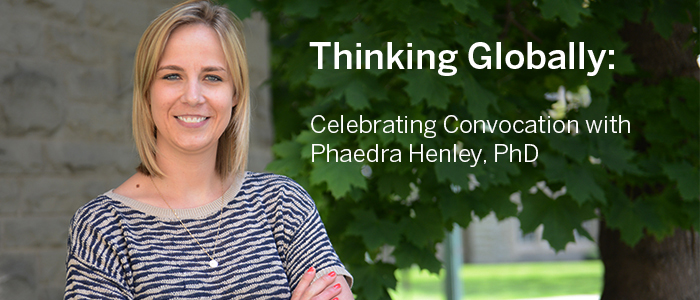Small changes make global impact

Phaedra Henley, PhD, says that spending time in developing communities has changed the way she sees her own life.
Henley, who graduated with her PhD in Pathology from the Schulich School of Medicine & Dentistry this spring, conducted field work in two Canadian First Nations communities as well as a large slum community in Kenya. She says it made the stress and worry in her own life seem less significant. “Whenever I am feeling anxious and stressed out, I just think about what others have to deal with just for day-to-day survival,” she said.
Henley’s Ecosystem Health research involved the active participation of the communities in which she worked and has shown that fairly small changes can have a big impact on human health. By working closely with the populations in Walpole Island, Attawapiskat and a large Kenyan community surrounding Lake Naivasha, Henley explored the relationship between health, stress and exposure to environmental contaminants in these developing communities.
“The overarching conclusion that we reached is that knowing the real relationship between exposure to environmental contaminants and health risks will allow people to decrease their exposure and decrease their stress,” she said.
Using hair as way to measure both chemical exposure and stress levels, Henley evaluated the relationship between actual environmental contamination and what she referred to as “chemophobia” or a fear of chemicals.
What they found is that people in the two Canadian reservations – Walpole Island and Attawapiskat – had higher levels of both contaminants and stress levels when compared to a representative sample of the Canadian population. In the Kenyan population, while the stress levels were higher, the data showed that their fear of being exposed to pesticides from the robust flower farm industry, were actually unfounded.
Each of the three communities that they studied approached the team at Schulich Medicine & Dentistry with concerns about exposure to chemicals. The community leaders helped to design the research questions, the data collection and also helped in the process to design practical solutions once the data was collected and analyzed.
“This type of community-based study relies on an active partnership between the investigators and the community,” she said. “The overarching goal of an ecosystem health project is sustainability and you can’t really create practical solutions in a community without knowing what’s appropriate in the community,” she said.
This ability to conduct field research in a culturally sensitive manner has earned her numerous awards and accolades including the Africa Initiative Grant from the Centre for International Governance Innovation, the RBC Community Service Learning Grant, and the Students for Development Internship from the Association of Universities of Colleges and Canada.
“Phaedra’s PhD project is one of the most unique research projects at Western,” said Zia Khan, PhD, Associate Professor and Research Director in the Department of Pathology. “She has truly developed into a health research specialist.”
As for what’s in store for her after graduation, Henley says she is looking for opportunities in global health and environmental health and is leaving the rest up to fate. “I have been lucky so far because every time I’ve done something and I’m near the end, a new opportunity presents itself,” she said. “So, I can’t wait to see what’s next!”








